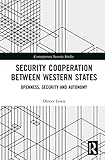Security Cooperation Between Western States : openness, security and autonomy / Olivier Lewis.
Material type: TextPublication details: London: New York: Routledge, Taylor & Francis, 2023.Edition: First published 2023Description: 261 Pages; 24 cmISBN:
TextPublication details: London: New York: Routledge, Taylor & Francis, 2023.Edition: First published 2023Description: 261 Pages; 24 cmISBN: - 9780367028152 (hbk)
- 355/.03 23/eng/20220608
- UA10.5 .L673 2023
| Item type | Current library | Collection | Call number | Copy number | Status | Notes | Barcode | |
|---|---|---|---|---|---|---|---|---|
 Books
Books
|
Zayed Military University General Stacks | General Collection | UA10.5 .L673 2023 (Browse shelf(Opens below)) | C. 1 | Available | AED 456.02 | 22192 |
Browsing Rabdan Academy shelves,Shelving location: General Stacks,Collection: General Collection Close shelf browser (Hides shelf browser)

|

|

|

|

|
No cover image available |

|
||
| UA10 .S272 2016 إدارة المؤسسات العسكرية النظرية والتطبيق | UA10.5 .C623 2022 Managing Security : concepts and challenges / | UA10.5 .C623 2022 Managing Security : concepts and challenges / | UA10.5 .L673 2023 Security Cooperation Between Western States : openness, security and autonomy / | UA10.5 .Q37 2018 الاتجاهات الجديدة في الدراسات الأمنية : | UA10.5 .S52 2000 مفهوم الأمن في ظل النظام العالمي الجديد / | UA11 .C539 2023 War, Technology and the State / |
Includes bibliographical references.
"This book examines security cooperation between Western states. Security cooperation occurs between Western (i.e. European and North American) states as a coping mechanism, as an imperfect substitute for integration. The book investigates the reasons for cooperation and what Aristotle called the 'final cause', as well as the material, formal, and efficient causes of cooperation. Such a causal explanation is based on a Critical Realist philosophy of social science. The book is also based on an embedded multiple-case study; the states studied are the United States, France, and Luxembourg. Within each state, the embedded subcases are three types of state security organizations: the armed forces, law enforcement, and intelligence agencies, which have rarely been compared in this way. Comparing different types of states and different types of state security organizations has allowed temporal, spatial, national, and functional variation in cooperation to be identified and theorized. The empirical evidence studied includes participant observations at the North Atlantic Treaty Organization and documents such as state policy documents, annual reports by organizations, reports by parliaments and non-governmental organizations, autobiographies, books by investigative journalists, and articles by newspapers and magazines. The book is also based on a score of elite interviews with ambassadors, diplomatic liaisons, ministerial advisors, foreign ministry officials, and military commanders. This book will be of much interest to students of security studies, intelligence studies, military studies and International Relations in general"--
There are no comments on this title.
